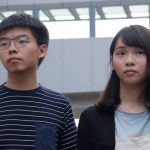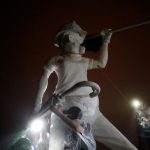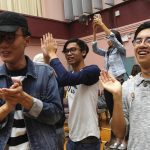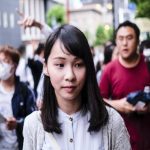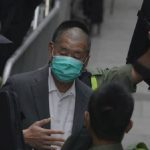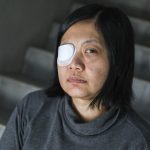The former leader of a Hong Kong pro-independence group who was jailed under the territory’s national security law, Tony Chung, has fled to the United Kingdom saying his life in Hong Kong was filled with fear.
In 2021, Chung, then 20 years old, was sentenced to three and a half years in prison after admitting guilt to “secession.” He posted on social media that he had traveled from Japan to the UK, arriving in London on December 27th, where he “formally applied for political asylum” upon admission.
He posted a photo of himself and his suitcase at UK customs.
After massive and occasionally violent pro-democracy protests had shook the region the year before, Beijing enforced the national security law on Hong Kong in the middle of 2020, arguing that the legislation was required to bring stability back.
The law has resulted in hundreds of arrests and punishes actions believed to be subversive, secessionist, conspiratorial with foreign powers, and extremist with up to life in jail. Others have fled, including journalists, activists, and elected officials.
According to Chung, he was freed from prison in June 2023 but had to continue reporting to the authorities on a regular basis.
Elaborating on the situation on X, Frances Hui, the policy and advocacy coordinator for the Committee for Freedom in Hong Kong Foundation, said that during those meetings, Chung was “coerced to provide details of every interpersonal interaction that he made, who he met [names and contact info], where they met [and] what they discussed. They also obtained access to his bank statements, financial aid applications etc …”
She said that the officers also offered him money to “snitch on others” and proposed arranging a trip to China, while Chung claimed he was barred from getting help from a lawyer or anybody else due to a secrecy provision surrounding his interactions with the national security police.
The former leader of a Hong Kong pro-independence group who was jailed under the territory’s national security law, Tony Chung, has fled to the United Kingdom saying his life in Hong Kong was filled with fear.
In 2021, Chung, then 20 years old, was sentenced to three and a half years in prison after admitting guilt to “secession.” He posted on social media that he had traveled from Japan to the UK, arriving in London on December 27th, where he “formally applied for political asylum” upon admission.
He posted a photo of himself and his suitcase at UK customs.
After massive and occasionally violent pro-democracy protests had shook the region the year before, Beijing enforced the national security law on Hong Kong in the middle of 2020, arguing that the legislation was required to bring stability back.
The law has resulted in hundreds of arrests and punishes actions believed to be subversive, secessionist, conspiratorial with foreign powers, and extremist with up to life in jail. Others have fled, including journalists, activists, and elected officials.
According to Chung, he was freed from prison in June 2023 but had to continue reporting to the authorities on a regular basis.
Elaborating on the situation on X, Frances Hui, the policy and advocacy coordinator for the Committee for Freedom in Hong Kong Foundation, said that during those meetings, Chung was “coerced to provide details of every interpersonal interaction that he made, who he met [names and contact info], where they met [and] what they discussed. They also obtained access to his bank statements, financial aid applications etc …”
She said that the officers also offered him money to “snitch on others” and proposed arranging a trip to China, while Chung claimed he was barred from getting help from a lawyer or anybody else due to a secrecy provision surrounding his interactions with the national security police.
The former leader of a Hong Kong pro-independence group who was jailed under the territory’s national security law, Tony Chung, has fled to the United Kingdom saying his life in Hong Kong was filled with fear.
In 2021, Chung, then 20 years old, was sentenced to three and a half years in prison after admitting guilt to “secession.” He posted on social media that he had traveled from Japan to the UK, arriving in London on December 27th, where he “formally applied for political asylum” upon admission.
He posted a photo of himself and his suitcase at UK customs.
After massive and occasionally violent pro-democracy protests had shook the region the year before, Beijing enforced the national security law on Hong Kong in the middle of 2020, arguing that the legislation was required to bring stability back.
The law has resulted in hundreds of arrests and punishes actions believed to be subversive, secessionist, conspiratorial with foreign powers, and extremist with up to life in jail. Others have fled, including journalists, activists, and elected officials.
According to Chung, he was freed from prison in June 2023 but had to continue reporting to the authorities on a regular basis.
Elaborating on the situation on X, Frances Hui, the policy and advocacy coordinator for the Committee for Freedom in Hong Kong Foundation, said that during those meetings, Chung was “coerced to provide details of every interpersonal interaction that he made, who he met [names and contact info], where they met [and] what they discussed. They also obtained access to his bank statements, financial aid applications etc …”
She said that the officers also offered him money to “snitch on others” and proposed arranging a trip to China, while Chung claimed he was barred from getting help from a lawyer or anybody else due to a secrecy provision surrounding his interactions with the national security police.
The former leader of a Hong Kong pro-independence group who was jailed under the territory’s national security law, Tony Chung, has fled to the United Kingdom saying his life in Hong Kong was filled with fear.
In 2021, Chung, then 20 years old, was sentenced to three and a half years in prison after admitting guilt to “secession.” He posted on social media that he had traveled from Japan to the UK, arriving in London on December 27th, where he “formally applied for political asylum” upon admission.
He posted a photo of himself and his suitcase at UK customs.
After massive and occasionally violent pro-democracy protests had shook the region the year before, Beijing enforced the national security law on Hong Kong in the middle of 2020, arguing that the legislation was required to bring stability back.
The law has resulted in hundreds of arrests and punishes actions believed to be subversive, secessionist, conspiratorial with foreign powers, and extremist with up to life in jail. Others have fled, including journalists, activists, and elected officials.
According to Chung, he was freed from prison in June 2023 but had to continue reporting to the authorities on a regular basis.
Elaborating on the situation on X, Frances Hui, the policy and advocacy coordinator for the Committee for Freedom in Hong Kong Foundation, said that during those meetings, Chung was “coerced to provide details of every interpersonal interaction that he made, who he met [names and contact info], where they met [and] what they discussed. They also obtained access to his bank statements, financial aid applications etc …”
She said that the officers also offered him money to “snitch on others” and proposed arranging a trip to China, while Chung claimed he was barred from getting help from a lawyer or anybody else due to a secrecy provision surrounding his interactions with the national security police.
The former leader of a Hong Kong pro-independence group who was jailed under the territory’s national security law, Tony Chung, has fled to the United Kingdom saying his life in Hong Kong was filled with fear.
In 2021, Chung, then 20 years old, was sentenced to three and a half years in prison after admitting guilt to “secession.” He posted on social media that he had traveled from Japan to the UK, arriving in London on December 27th, where he “formally applied for political asylum” upon admission.
He posted a photo of himself and his suitcase at UK customs.
After massive and occasionally violent pro-democracy protests had shook the region the year before, Beijing enforced the national security law on Hong Kong in the middle of 2020, arguing that the legislation was required to bring stability back.
The law has resulted in hundreds of arrests and punishes actions believed to be subversive, secessionist, conspiratorial with foreign powers, and extremist with up to life in jail. Others have fled, including journalists, activists, and elected officials.
According to Chung, he was freed from prison in June 2023 but had to continue reporting to the authorities on a regular basis.
Elaborating on the situation on X, Frances Hui, the policy and advocacy coordinator for the Committee for Freedom in Hong Kong Foundation, said that during those meetings, Chung was “coerced to provide details of every interpersonal interaction that he made, who he met [names and contact info], where they met [and] what they discussed. They also obtained access to his bank statements, financial aid applications etc …”
She said that the officers also offered him money to “snitch on others” and proposed arranging a trip to China, while Chung claimed he was barred from getting help from a lawyer or anybody else due to a secrecy provision surrounding his interactions with the national security police.
The former leader of a Hong Kong pro-independence group who was jailed under the territory’s national security law, Tony Chung, has fled to the United Kingdom saying his life in Hong Kong was filled with fear.
In 2021, Chung, then 20 years old, was sentenced to three and a half years in prison after admitting guilt to “secession.” He posted on social media that he had traveled from Japan to the UK, arriving in London on December 27th, where he “formally applied for political asylum” upon admission.
He posted a photo of himself and his suitcase at UK customs.
After massive and occasionally violent pro-democracy protests had shook the region the year before, Beijing enforced the national security law on Hong Kong in the middle of 2020, arguing that the legislation was required to bring stability back.
The law has resulted in hundreds of arrests and punishes actions believed to be subversive, secessionist, conspiratorial with foreign powers, and extremist with up to life in jail. Others have fled, including journalists, activists, and elected officials.
According to Chung, he was freed from prison in June 2023 but had to continue reporting to the authorities on a regular basis.
Elaborating on the situation on X, Frances Hui, the policy and advocacy coordinator for the Committee for Freedom in Hong Kong Foundation, said that during those meetings, Chung was “coerced to provide details of every interpersonal interaction that he made, who he met [names and contact info], where they met [and] what they discussed. They also obtained access to his bank statements, financial aid applications etc …”
She said that the officers also offered him money to “snitch on others” and proposed arranging a trip to China, while Chung claimed he was barred from getting help from a lawyer or anybody else due to a secrecy provision surrounding his interactions with the national security police.
The former leader of a Hong Kong pro-independence group who was jailed under the territory’s national security law, Tony Chung, has fled to the United Kingdom saying his life in Hong Kong was filled with fear.
In 2021, Chung, then 20 years old, was sentenced to three and a half years in prison after admitting guilt to “secession.” He posted on social media that he had traveled from Japan to the UK, arriving in London on December 27th, where he “formally applied for political asylum” upon admission.
He posted a photo of himself and his suitcase at UK customs.
After massive and occasionally violent pro-democracy protests had shook the region the year before, Beijing enforced the national security law on Hong Kong in the middle of 2020, arguing that the legislation was required to bring stability back.
The law has resulted in hundreds of arrests and punishes actions believed to be subversive, secessionist, conspiratorial with foreign powers, and extremist with up to life in jail. Others have fled, including journalists, activists, and elected officials.
According to Chung, he was freed from prison in June 2023 but had to continue reporting to the authorities on a regular basis.
Elaborating on the situation on X, Frances Hui, the policy and advocacy coordinator for the Committee for Freedom in Hong Kong Foundation, said that during those meetings, Chung was “coerced to provide details of every interpersonal interaction that he made, who he met [names and contact info], where they met [and] what they discussed. They also obtained access to his bank statements, financial aid applications etc …”
She said that the officers also offered him money to “snitch on others” and proposed arranging a trip to China, while Chung claimed he was barred from getting help from a lawyer or anybody else due to a secrecy provision surrounding his interactions with the national security police.
The former leader of a Hong Kong pro-independence group who was jailed under the territory’s national security law, Tony Chung, has fled to the United Kingdom saying his life in Hong Kong was filled with fear.
In 2021, Chung, then 20 years old, was sentenced to three and a half years in prison after admitting guilt to “secession.” He posted on social media that he had traveled from Japan to the UK, arriving in London on December 27th, where he “formally applied for political asylum” upon admission.
He posted a photo of himself and his suitcase at UK customs.
After massive and occasionally violent pro-democracy protests had shook the region the year before, Beijing enforced the national security law on Hong Kong in the middle of 2020, arguing that the legislation was required to bring stability back.
The law has resulted in hundreds of arrests and punishes actions believed to be subversive, secessionist, conspiratorial with foreign powers, and extremist with up to life in jail. Others have fled, including journalists, activists, and elected officials.
According to Chung, he was freed from prison in June 2023 but had to continue reporting to the authorities on a regular basis.
Elaborating on the situation on X, Frances Hui, the policy and advocacy coordinator for the Committee for Freedom in Hong Kong Foundation, said that during those meetings, Chung was “coerced to provide details of every interpersonal interaction that he made, who he met [names and contact info], where they met [and] what they discussed. They also obtained access to his bank statements, financial aid applications etc …”
She said that the officers also offered him money to “snitch on others” and proposed arranging a trip to China, while Chung claimed he was barred from getting help from a lawyer or anybody else due to a secrecy provision surrounding his interactions with the national security police.



